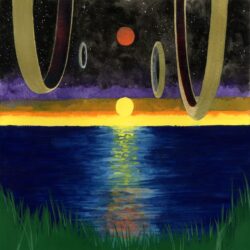A sophomore album that at times appears a little unsure of its own identity or musical direction.
 John Calvin released his debut album “Masquerade Monday”, back in 2018 under the watchful eye of producer Nate Campisi, marrying his introspective songwriting with a generous helping of dirt under the fingernail, blue-collared rock to much critical approval. The fact that it has taken a further six years for a follow-up can in-part be blamed on the pandemic, with work on his sophomore album beginning in 2020, again with Campisi at the helm, though the choice of recording the album in Pittsburgh whilst Calvin still lived in Dallas clearly added its own geographical implications. It therefore required numerous visits to the studio, often for just a couple of weeks at a time, spread across the following three years before this new offering “Greener Fields And Fairer Seas”, was finally completed.
John Calvin released his debut album “Masquerade Monday”, back in 2018 under the watchful eye of producer Nate Campisi, marrying his introspective songwriting with a generous helping of dirt under the fingernail, blue-collared rock to much critical approval. The fact that it has taken a further six years for a follow-up can in-part be blamed on the pandemic, with work on his sophomore album beginning in 2020, again with Campisi at the helm, though the choice of recording the album in Pittsburgh whilst Calvin still lived in Dallas clearly added its own geographical implications. It therefore required numerous visits to the studio, often for just a couple of weeks at a time, spread across the following three years before this new offering “Greener Fields And Fairer Seas”, was finally completed.
From the opening bars of the first track ‘Rest Of My Roads’, it soon becomes apparent that this new release is a far more musically ambitious album than the loose vibe, both in song structure and arrangement, of its predecessor, exposing at times a greater depth and complexity within the lyrical narrative and production. Calvin draws much inspiration from the burgeoning singer-songwriter scene of the late sixties and early seventies, and in particular Van Morrison. This influence is most effective on the third track ‘Austin Chalk’, with its gentle acoustic accompaniment and soulful vocal delivery inhabiting a similar sound found on Morrison’s “Moondance”, album, while the equally impressive ‘Saint Innocent’, with its wistful narrative, along with some excellent Pedal steel playing from Pete Freeman and soulful backing vocals from Kelsey Jumper creates a country vibe not to dissimilar to that found on “Tupelo Honey”. Those influences continue to be prevalent, though with decreasing levels of success on both ‘Garden State Variety’, and ‘High Is My Favourite Hight’, with their rather whimsical narratives and muddled arrangements drawing comparison to Morrison’s more inconsistent eighties period.
Morrison is not the only obvious touchstone here with both ‘I Can Make Your Heart Mine’, and ‘Hazel Or Blue’, convincingly mining an early nineties Bruce Springsteen vibe, though the addition of the flute on the latter, admittedly well delivered, is a distraction which at best simply helps to disguise a melody that fails to support the poetic narrative. The chameleon flavour to the album continues on tracks such as ‘Gravity’, with its post-grunge demeanour, while ‘Ode To Denis Johnson’, sounds like a cross between the Red Hot Chilli Peppers and the Manic Street Preachers with a guitar solo straight from Edwyn Collins’ fret board battling for the spotlight against a Clarence Clemons flavoured saxophone solo. It’s confusing at best, and a million miles away from the emotive fragility of ‘She Might Be A Song’, or even the pent-up tension delivered on ‘Our Souls Have Broken Chains’, which together find Calvin breaking free of his influences, coming closest to creating a style he can call his own. The album closes with another somewhat bewildering offering as the traditional folk song ‘Shenandoah’, is delivered with lashings of distorted guitar that comes close to rendering the melody obsolete.
“Greener Fields And Fairer Seas”, is a confusing and at times frustrating album that in truth was probably not helped by the recording’s elongated gestation period. That said, it is not without its merits, with many of the songs coming across well when listened to individually, which I fully accept in the third decade of the 21st century is how most people listen to music these days. However, this is an album review and collectively it lacks a sense of cohesion, with too many musical styles failing to equal the sum of their parts. Much of the problem can be laid at the feet of an over the top production, with horns and strings all competing for a space that in hindsight may well have been better served more sparsely, allowing the tracks to breath, giving or possibly even forcing Calvin to impart more of his own identity upon them, rather than simply paying homage to his hero’s, though in truth the heavy arrangement does manage to disguise a weak melody on more than one occasion. However, where it does work, as it does on such tracks as ‘Saint Innocent’, ‘Austin Chalk’, and ‘Our Souls Have Broken Chains’, there is enough evidence of Calvin’s poetic soul and strength as a songwriter to warrant any future releases worthy of further investigation.


